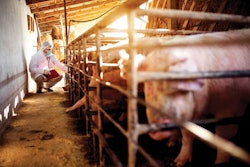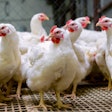
For the first time, cases of African swine fever (ASF) in pigs have been found in the Eastern Visayas region of the Philippines.
In July 2019, first cases of African swine fever (ASF) occurred among pigs in the Philippines, according to the World Organisation for Animal Health (OIE). Officially, outbreaks are ongoing in 27 of the country’s 83 administrative regions.
Last week, ASF was reported in the province of Albay. Belonging to the Bicol Region, Albay is located in the Luzon Island group.
Disease spreads to Eastern Visayas, Mindanao
Now, the infection has been detected in the Eastern Visayas region for the first time, reports Philippine News Agency (PNA).
Last week, four pigs tested positive for the ASF virus in Letye province in this region after mortality began to rise sharply at the end of December. Initially, all pigs within 500 meters of the outbreak were culled, and this has now been applied to more than 500 animals in several villages in this area.
On the island of Mindanao, culling is also underway in the Davao Region after ASF outbreaks have occurred again among pigs in Davao Oriental and Davao de Oro. Although backyard herds were the first to test positive for the virus, authorities are following up on suspicions of an outbreak at the commercial farm in Montevista with almost 2,000 pigs.
Disease controls threaten pork shortages in the Philippines
After the previous outbreaks in the country and around Asia, PNA reported that authorities in the Philippines introduced measures to prevent the further spread of ASF.
As well as culling and disinfection in the immediate area of an outbreak, inspections were carried out at provincial borders. Only pigs and pork products with certification of origin in a disease-free area were allowed.
Recently, the Department of Agriculture director for Central Luzon Region has declared that ASF is present in almost all provinces of the island of Luzon.
With pork supplies from other areas of the country heavily restricted due to the ASF control measures, PNA reports fears of shortages across the island, particularly in the National Capital Region that includes Manila.
As a result, prices have risen sharply to as much as PHP450 (US$9.36) per kilo.
To prevent the spread of the disease to the region, the director discouraged consumers from buying pork online as the source is uncertain. With the same aim, local pig raisers are urged not to feed their animals on swill.
The region’s hog industry is worth PHP20 billion, according to the director. Eighty percent of pig keepers have small herds that are essential for domestic consumption and income, she said.
China outbreak: unconfirmed
According to Business Recorder, an outbreak of ASF has been confirmed at a pig farm in Guangdong province. More than 200 of the 1,019 animals have died. The source reports that this is China’s first ASF outbreak since October 2020. It also cites an agriculture ministry statement that illegal pig transportation is the likely source of infection.
So far, there has been no confirmation of the outbreak by China’s Ministry of Agriculture or other official sources.
This month, the ministry announced that restrictions had been lifted after a previous outbreak in Yunnan province. The disease was confirmed in Lijiang city in Yongsheng county in early July 2020. After depopulation of the pigs, cleaning and disinfection, surveillance has revealed no sign of the ASF virus for more than 21 days.
In early August 2019, China recorded the country’s first case of ASF in pigs. According to OIE, 186 outbreaks have been reported in all 31 of the nation’s administrative divisions. While 166 of these outbreaks have been resolved, 20 are still considered to be ongoing. This means that there is a risk of the disease re-emerging in these nine regions. Direct losses of pigs registered with the OIE amount to more than 391,000.
Russia, South Korea record new cases in wild boar
During the past week, South Korea’s agriculture ministry has reported to the OIE 23 new ASF cases among its wild boar population.
The infected animals were found in the period January 9-15 in the northern provinces of Gangwon and Gyeonggi.
One wild boar infected with ASF has been found in the Primorksie krai region the Far Eastern federal district, according to the Russian agriculture ministry.
ASF returns to Tanzania
After the rapid spread of infection, more than 500 pigs have died of ASF in Tanzania, reports Chinese news agency Xinhua. The outbreak started in late December in the Shinyanga region in the north of the country. Local authorities have banned pork sales in the area in order to prevent further spread.
According to the same source, ASF killed more than 900 pigs in a southern region of the East African state in March of 2018.
View our continuing coverage of the global African swine fever situation.

















